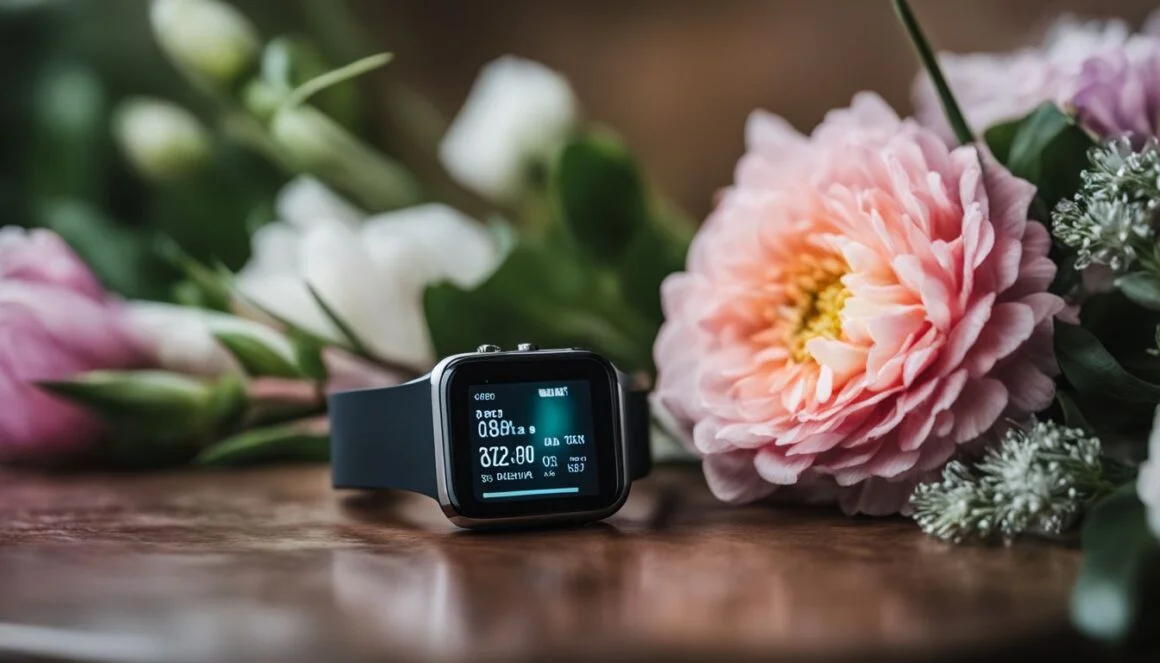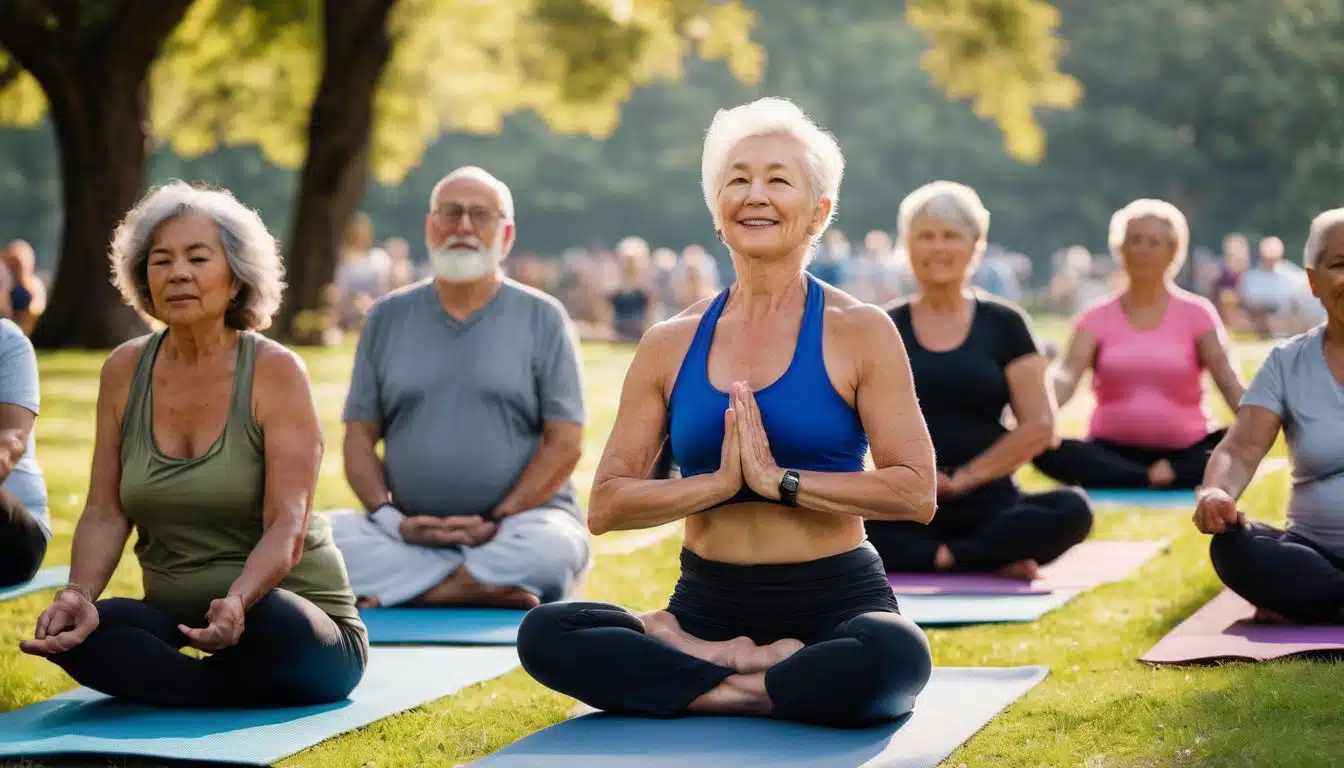This blog will lay the groundwork on how to integrate a holistic approach into your daily routine – focusing on diet, exercise, mental stimulation, social engagement and e-health tools.
Ready to reinvent your golden years? Let’s dive in!
Key Takeaways
- Combining physical and mental health practices is important for healthy aging.
- Holistic health addresses the whole self, including the body, mind, feelings, friends, and spirit.
- E-health technologies support holistic health by providing data on various aspects of well-being.
- Physical health affects mental well – being, while good mental health contributes to physical wellness.
- A balanced diet, regular exercise, mental stimulation, and social engagement are key components of a holistic approach to aging well.
- Regular health check-ups are essential for maintaining overall well-being as we age.
- Mobile health interventions, telehealth services, and wearable health monitors play a crucial role in promoting holistic health in aging.
Holistic Approach to Aging Well

Holistic health is defined as the integration of physical, mental, and emotional well-being to achieve overall wellness. It plays a vital role in promoting aging well by addressing all aspects of an individual’s health.
E-health technologies have also become instrumental in supporting holistic health practices.
Definition and Importance
Holistic health looks at the whole self. It means we think about our body, mind, feelings, friends and spirit. All these parts connect to each other. For example, if you are sick (body), you may feel sad (mind).
Or if you have no friends (social), you might feel lonely (feelings). Holistic health is a key part of aging well. People who pay attention to their mental health live longer and better lives than those who don’t.
That’s why world strategies aim to cut down diseases that can’t be passed on to others and early deaths by looking at mental health too. To stop heart diseases before they happen or control them when they do, we must understand mental health as well.
The Role of E-Health Technologies in Promoting Holistic Health
E-health tools are good for older adults’ wellness. These tools can test how the brain works and check body actions and feelings. One study looked at 27 people who live in a place for old folks not needing lots of help.
It found e-health data links to many parts of health. This includes brain, body, and daily task skill levels. They did not find any ties between e-health data and how we view the world and our place in it.
All the info from different health tech sources was put into one big pool. Then they got a full picture of person’s whole health or holistic health status from that pool of data. The people in this study liked using these tech tools to look at their whole health state as well as each part separately.
The Connection Between Physical and Mental Health

Physical health has a significant impact on mental well-being, while mental health also plays a crucial role in physical wellness.
How Physical Health Affects Mental Well-being
Being healthy is not only about the body. It is also about the mind. Your body and your mind connect in many ways. When you take care of your body, your mind feels happy too.
For example, when you move and play sports, it helps keep down stress. This makes you feel good inside. Eating right can help too. When we eat good food, our bodies work better. That means our brains work better too! A healthy brain leads to a happier outlook on life.
Bad health can lead to bad feelings in the mind as well though. For example, being sick or hurt a lot can make us feel sad or scared more often than usual.
So remember: when we keep our bodies healthy, we are keeping our minds healthy too!
How Mental Health Affects Physical Wellness
Mental health is key to physical wellness. A study found a strong link between mind and body in older adults. Good mental health boosts cognitive skills, like planning and focus. It also helps with everyday jobs such as cooking or cleaning (functional variables).
The best part? E-health technologies were used to track these facts. But it wasn’t just about brains and tasks. People with good mental health often have better physical wellness too! It means they might have a normal blood pressure, heart rate, or glucose level more often than others.
So, taking care of your mind can help keep your body fit too!
Holistic Approach to Aging Well

A balanced diet, regular exercise, mental stimulation, and social engagement are all important components of a holistic approach to aging well.
Importance of a Balanced Diet
A balanced diet is crucial for older adults to maintain their health and well-being. It helps prevent chronic diseases like heart disease, diabetes, and certain types of cancer. By maintaining a healthy weight, they can reduce the risk of obesity-related conditions.
A balanced diet also supports brain health and cognitive function, preventing age-related cognitive decline. Older adults should ensure they have adequate intake of vitamins and minerals, especially calcium and vitamin D, to keep their bones strong and prevent osteoporosis.
Eating nutrient-dense foods helps them stay energized and maintain their functional abilities.
The Role of Regular Exercise
Regular exercise plays a crucial role in maintaining physical fitness and overall well-being for older adults. It can help prevent or manage chronic conditions such as heart disease, diabetes, and osteoporosis.
Exercise is also beneficial for cognitive function, reducing the risk of cognitive decline in older adults. Additionally, regular physical activity has positive effects on mental health by reducing symptoms of depression and anxiety.
To reap these benefits, it’s important to engage in a balanced exercise program that includes aerobic activities, strength training exercises, and flexibility exercises. So make sure to prioritize regular exercise to stay fit and healthy as you age.
Mental Stimulation and Social Engagement
Engaging in activities that stimulate the mind and participating in social interactions are crucial for aging well. Mentally stimulating activities like reading, solving puzzles, and learning new skills can have a positive impact on cognitive function and overall mental health.
These activities help keep the brain active and prevent cognitive decline. Additionally, staying socially engaged by maintaining relationships, being part of community groups or clubs, and participating in social activities can enhance emotional well-being and reduce feelings of isolation.
Social engagement also provides opportunities for intellectual stimulation through conversations and shared experiences with others. By prioritizing mental stimulation and social engagement, older adults can improve their quality of life and promote healthy aging.
Importance of Regular Health Check-ups
Regular health check-ups are essential for maintaining overall well-being, especially as we age. These check-ups help to identify any underlying health issues before they become more serious and harder to treat.
By visiting your healthcare provider regularly, you can stay on top of preventative measures such as vaccinations and screenings for diseases like cancer or diabetes. Regular check-ups also allow your doctor to monitor changes in your health over time, ensuring that any necessary interventions or treatments are implemented promptly.
Taking care of your physical health through regular check-ups is an important part of practicing a holistic approach to aging well.
E-health Tools for Holistic Health in Aging

E-health tools such as mobile health interventions, telehealth services, and wearable health monitors play a crucial role in promoting holistic health in aging. Discover how these innovative technologies are transforming the way older adults can improve their physical and mental well-being.
Mobile Health Interventions
Mobile health interventions, also known as mHealth, use mobile devices like smartphones and tablets to deliver healthcare services and support. These interventions can include apps that provide tools for monitoring health conditions, reminders for medication adherence, access to educational materials, and even virtual consultations with healthcare professionals.
Research has shown that mHealth interventions have the potential to improve health outcomes in older adults by increasing their engagement in self-care activities and providing them with convenient access to healthcare resources.
For example, a systematic review of studies found that mHealth interventions helped older adults manage chronic diseases such as diabetes and hypertension more effectively. So incorporating mobile health interventions into holistic approaches to aging well can be beneficial for promoting overall physical and mental wellness among older adults.
Telehealth Services
Telehealth services play a crucial role in promoting holistic health for older adults. These services use e-health technologies to assess cognitive performance, physiological and functional variables, and psychometric components of wellness.
Participants in a study expressed positive attitudes towards telehealth tools and the holistic approach to wellness assessment. Through telehealth kiosks, participants had access to their own vital sign data and received monthly printed reports of all assessments.
This improves access to healthcare, especially for older adults in remote or underserved areas. Telehealth services can also be used for remote monitoring of chronic conditions, medication management, and mental health support.
Wearable Health Monitors
Wearable health monitors are devices that can be worn on the body to track and monitor various health parameters. These monitors play a role in monitoring and managing health conditions in older adults.
For example, they can measure blood pressure, heart rate, glucose levels, and even track physical activity. By providing real-time data about their health, wearable health monitors empower older adults to take control of their well-being and make informed decisions about their lifestyle.
These devices contribute to promoting active aging and preventing chronic diseases by enabling individuals to monitor their progress towards fitness goals or detect any potential health issues early on.
The integration of wearable health monitors into healthcare systems can improve the quality of life for older adults by facilitating personalized care plans based on accurate and up-to-date information.
Case Studies on Holistic Health Interventions for Aging
Examining successful implementations and results of holistic health interventions for older adults, as well as potential limitations and solutions.
Successful Implementations and Results
The study conducted on 27 residents of an independent retirement community over the course of 8 weeks showed successful implementations and positive results. The researchers utilized various e-health technologies to assess cognitive performance, physiological and functional variables, and psychometric components of wellness.
They found strong associations among different aspects of wellness such as cognitive, functional, and physical factors. However, spirituality did not correlate with other parameters studied in this research.
Participants had a favorable attitude towards the e-health tools used in the study and embraced the holistic approach to wellness assessment without any privacy concerns.
Possible Limitations and Solutions
The study had a few limitations that could affect the generalizability of the findings. First, the sample size was small, which means that there may not have been enough statistical power to analyze wellness over time accurately.
Second, the participants in the study were from a specific older adult group, so it’s unclear if these findings would apply to other populations. However, despite these limitations, standardizing and deploying e-health technologies across different groups could help providers determine if tailored interventions are needed for maintaining wellness.
How to Develop a Personalized Holistic Health Plan
Developing a personalized holistic health plan involves assessing your health needs, setting achievable goals, implementing and monitoring the plan, and seeking professional assistance.
Assessing Your Health Needs
To develop a personalized holistic health plan, it’s important to assess your health needs. This means taking the time to understand your physical and mental well-being. By considering both aspects of your health, you can identify any areas that may need improvement or attention.
Self-assessment plays a key role in this process, as it allows you to reflect on how you’re feeling physically and mentally. It’s essential to be honest with yourself about your strengths and weaknesses so that you can create goals that are achievable and tailored to your specific needs.
By assessing your health needs, you can take proactive steps towards improving your overall well-being as part of a holistic approach to aging well.
Setting Achievable Health Goals
To achieve overall well-being, it is important to set achievable health goals. These goals should be personalized and realistic based on individual needs and capabilities. By setting specific targets for improving physical and mental health, individuals can take proactive steps towards aging well.
It is recommended to seek professional guidance when developing a holistic health plan to ensure that the goals are appropriate and attainable. Having clear objectives in mind helps individuals stay motivated and focused on their journey towards better health.
Implementing and Monitoring Your Health Plan
To successfully implement and monitor your health plan, it is important to follow some key steps. Firstly, incorporate regular exercise and physical activity into your routine as part of the plan.
This can include activities like walking, swimming, or yoga. Secondly, focus on maintaining a healthy and balanced diet that includes fruits, vegetables, whole grains, lean proteins, and limited processed foods.
Thirdly, don’t forget to consider psychological and mental health aspects in your plan by engaging in activities that promote relaxation and stress reduction such as meditation or spending time with loved ones.
Seeking Professional Assistance
It is important to seek professional assistance when developing a personalized holistic health plan for aging well. Professionals, such as healthcare providers or wellness coaches, can provide guidance and support throughout the process.
They have the knowledge and expertise to assess your specific needs and help you set achievable health goals. With their assistance, you can implement and monitor your health plan effectively, ensuring that it meets your individual requirements.
Seeking professional assistance will ensure that your holistic health plan is tailored to address both your physical and mental well-being, leading to better overall outcomes in aging.
In conclusion, seeking professional assistance is crucial in developing a personalized holistic health plan for aging well. Professionals can provide the necessary guidance, support, and expertise to help individuals create an effective plan that addresses their unique needs.
The role of healthcare professionals in promoting a holistic approach to aging
Healthcare professionals play a crucial role in promoting a holistic approach to aging. They provide guidance and support to older adults in maintaining their physical and mental well-being.
Healthcare professionals educate older adults about the importance of leading a balanced lifestyle that includes regular exercise, healthy eating, mental stimulation, and social engagement.
They also encourage older adults to prioritize their overall health by scheduling regular check-ups and screenings to detect any potential health issues early on. By taking a holistic approach, healthcare professionals can help older adults age well and improve their quality of life.
– According to the World Health Organization (WHO), healthcare professionals are essential in providing person-centered care for older adults.
– Healthcare professionals can address the specific needs of older adults, including managing chronic conditions and preventing age-related diseases.
– By incorporating both physical and mental health aspects into their practice, healthcare professionals can help promote overall wellness among older individuals.
– The role of healthcare professionals extends beyond medical treatment; they also provide emotional support and assist with creating personalized health plans for aging individuals.
Conclusion
In conclusion, a holistic approach to aging well, which integrates physical and mental health, is crucial for the overall well-being of older adults. By prioritizing a balanced diet, regular exercise, mental stimulation, social engagement, and regular health check-ups, individuals can promote their physical and mental wellness as they age.
Additionally, leveraging e-health tools such as mobile health interventions, telehealth services, and wearable health monitors can further support holistic health in aging. By implementing personalized holistic health plans and involving healthcare professionals in the process, older adults can lead healthy and fulfilling lives as they grow older.
Frequently Asked Questions (FAQs)
What is a health system?
A health system refers to the organization and resources put in place to deliver healthcare services, including the infrastructure, people, and institutions involved in promoting, restoring, or maintaining health. It encompasses various aspects such as healthcare facilities, healthcare providers, health insurance systems, and public health initiatives.
What is mindfulness?
Mindfulness is the practice of bringing one’s attention to the present moment in a non judgmental and accepting way. It involves being fully aware of our thoughts, feelings, bodily sensations, and the surrounding environment. Mindfulness techniques and practices are often used to reduce stress, increase self-awareness, improve mental well-being, and enhance overall quality of life.
How can we foster resilience?
Fostering resilience involves developing the ability to adapt and cope effectively with adversity, stress, and challenges. It is about being able to bounce back from setbacks and maintain overall well-being. Building resilience can be achieved through various strategies, such as developing strong support networks, practicing self-care, maintaining a positive mindset, setting realistic goals, and seeking professional help when needed.
What is meant by mental and physical health?
Mental and physical health are two interconnected aspects of overall well-being. Mental health refers to a person’s emotional, psychological, and social well-being, while physical health encompasses the condition of a person’s body and the absence of physical illnesses or impairments. Both mental and physical health are essential for leading a balanced and gratifying life.
What is primary care?
Primary care is the initial point of contact for individuals seeking healthcare services. It involves the provision of comprehensive, continuous, and coordinated healthcare for common illnesses, preventive care, and management of chronic conditions. Primary care providers, such as general practitioners and family physicians, play a vital role in promoting health, preventing diseases, and addressing various healthcare needs of individuals.
How has the COVID-19 pandemic impacted health care services?
The COVID-19 pandemic has had significant impacts on health care services worldwide. It has strained healthcare resources, disrupted regular healthcare delivery systems, and led to the prioritization of COVID-19-related care. Many routine healthcare services have been delayed or temporarily suspended, leading to challenges in accessing necessary care. Furthermore, the pandemic has highlighted the importance of adopting innovative approaches, such as telemedicine and remote healthcare, to ensure the continuity of care.
What are mental health services?
Mental health services refer to a range of professional support and interventions aimed at addressing mental health concerns and promoting psychological well-being. These services may include psychotherapy

